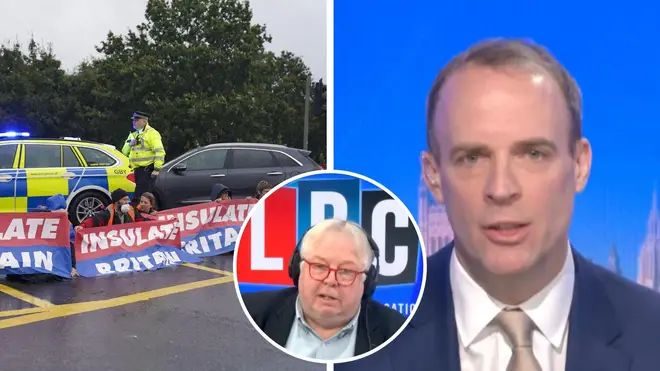
Rachel Johnson 7pm - 10pm
18 January 2022, 08:12 | Updated: 18 January 2022, 08:51

Dominic Raab: Insulate Britain isn't peaceful protest it's sabotage
Deputy Prime Minister Dominic Raab sparked a major row about the right to protest today after describing the actions of Insulate Britain protesters as 'sabotage' and not 'peaceful protest.'
His comments on LBC this morning come after the Government's controversial plans to crack down on disruptive protests suffered a series of defeats in the House of Lords.
The wide-ranging Police, Crime, Sentencing and Courts Bill was set to introduce changes that put protesters at risk of lengthy prison sentences and large fines for actions that cause "serious annoyance" - which could include actions like making too much noise.
Speaking to Nick Ferrari at breakfast this morning amid a blistering row over the contents of the bill, which opponents say would seriously damage civil liberties, Mr Raab said the plans were part of a wider plan to increase police numbers and increase sentencing powers.

“Just last night we saw Labour and the Liberal Democrats in the House of Lords, vote against our powers to stop Extinction Rebellion and Insulate Britain sabotaging, under the guise of lawful protest, by blocking the M25, stopping people getting from work, and in the case of Insulate Britain, stopping ambulances from getting to the sick," he said.
Nick challenged Mr Raab, arguing that this bill would have stopped the suffragettes and anti-apartheid protests and that police already have adequate powers to tackle these sorts of protests.
“Is this now a nation that would rule out all demonstrations such as this Mr Raab?” Nick asked.

Police confiscate Insulate Britain banners
“No. I’ve always been a champion of peaceful protest. I think most people will understand the distinction between making your point vocally, strongly, ardently, and actually trying to interfere with people going about their lawful business.
“The huge cost to police in dealing with what is no longer just normal, peaceful protest, but sabotage.”
New powers rejected in the Lords last night included:
Eco protesters like Insulate Britain have caused travel chaos on the roads in recent months, blockading the M25 and glueing themselves to the ground in a bid to get the Government's attention over the climate crisis.
Earlier on Monday, the Lords also defeated other proposed curbs on demonstrations, including powers to impose conditions on protests judged to be too noisy.
Following the vote, the amended bill is set to return to the Commons for further debate, as part of a Parliamentary back-and-forth known as ping-pong.
Peers were strongly critical after measures had been introduced at such a late stage of the passage of the Bill, after it had already gone through the elected House.
Labour frontbencher Lord Rosser pointed out the "sweeping, significant and further controversial powers" had not been considered by the Commons and branded it an "outrageous way to legislate".
He said: "We cannot support any of these last-minute, rushed and ill-thought-through broad powers... with the exception of approving the increased sentences for wilfully obstructing motorways and major roads."
However, Home Office minister Baroness Williams of Trafford stressed the need for the measures and argued they were "vitally important in protecting the country from the highly disruptive tactics employed by a small number of people".
She added: "The rights to freedom of speech and assembly are a cornerstone of our democracy and this Government will not shrink from defending them.
"But a responsible Government, one that stands up for the rule of law, must also defend the rights and freedom of the law-abiding majority.
"Their rights cannot and must not be trampled on by a small minority of protesters, who believe they should not be answerable to the law and should be given carte blanche to cause any amount of disruption at any cost."